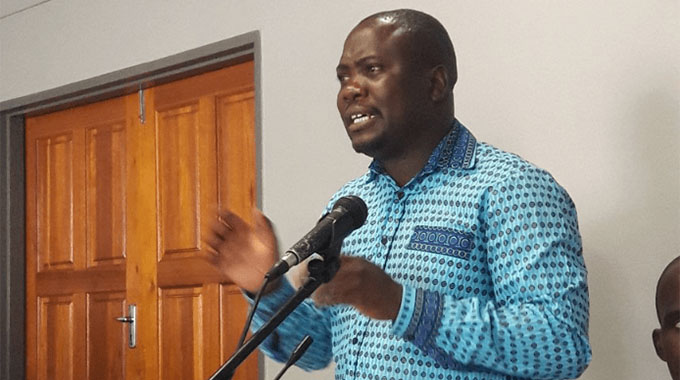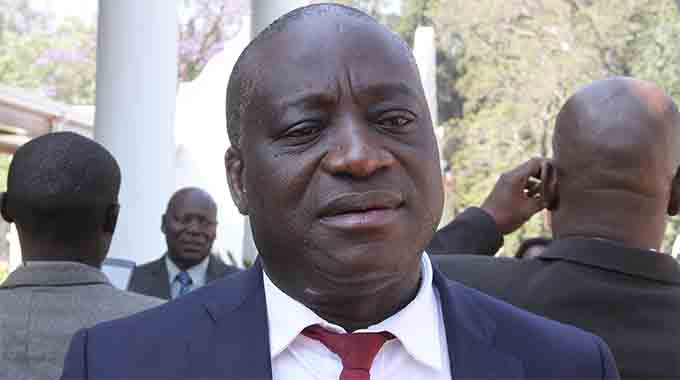Top cop outlines operational challenges

Herald Reporter
Police manning roadblocks and securing quarantine centres need more protective equipment, transport and allowances for food, with quarantine centres needing more lights and fencing, Commissioner-General Godwin Matanga told a Parliamentary committee yesterday.
Appearing before the Health and Child Care Parliamentary Portfolio Committee, a meeting also attended by officials from the Ministry of Home Affairs and Cultural Heritage and chief director of the Department of Immigration, Comm-Gen Matanga outlined the problems facing his officers.
The police are deploying 18 000 officers to enforce the lockdown regulations, checking on the movement and sale of subsidised maize and keeping order in mining areas, a large number that all need to be protected, transported and have access to meals and other needs, he said.
Comm-Gen Matanga said it was difficult for officers to observe social distancing, as they did not have enough vehicles for transport, so police were crowded into the few vehicles available, and in any case police dealt with criminals and had to frequently get into close contact.
More officers had been deployed at all quarantine centres, with additional manpower sourced from the army, but that work was not as easy as it seemed.
“There is need for repairs and the erection of high fences plus flood lights at quarantine centres,” said Comm-Gen Matanga.
“Patrols are conducted around quarantine centres with difficulties. A budget for the repairs and procurement of torches and cameras has been submitted to the Home Affairs Ministry.
“Returnees and deportees have not run out of food, but police officers from the onset of the pandemic have not received travel and subsistence allowances and rations.
“I am expected to deploy 100 officers on the ground and it is now difficult. It’s almost like we are exposing them to Covid-19, making them depend on people’s generosity to make ends meet.”
Comm-Gen Matanga expressed concern that in some cases, medical staff were not present at the quarantine centres and it would be the police officers and army officers doing everything.
“We have had some cases where patients die and the body is supposed to be taken to the mortuary and some medical officers run away suspecting the person to have died of Covid-19,” he said.
“The police officer has nothing to do, but take the body to the mortuary and sometimes without adequate personal protective equipment.
“As ZRP, we are not allowed to receive donations, but they are given through the Civil Protection Unit. We have 18 900 officers deployed on the ground for Covid-19 and GMB to ensure people do not divert maize and also to patrol at illegal mines.”
Comm-Gen Matanga said reports of corruption at the quarantine centres had come to his office.
“Some people detained at the quarantine centres end up buying food and offering it to my officers,” he said.
Comm-Gen Matanga recommend the use of technology to man some of the centres and gave examples of other countries that were using drones.
On complaints of the police harassing people at roadblocks, Comm-Gen Matanga said police did not interpret the law, but only enforced the rules.
“It is unfortunate that some elements would want to take advantage of the lockdown and want to ride on it to advance their own agendas,” he said.
“I have evidence that some sitting councillors are now authorising people to get into the CBD, but they have no right to do so.”
Comm-Gen Matanga warned that by end of the week he was going to deal with the councillors. The committee was chaired by Hurungwe Central Member of Parliament Cde Dought Ndiweni.
Ministry of Health and Child Care acting permanent secretary, Dr Gibson Mhlanga, told the committee that his ministry had challenges of people escaping quarantine during the early days, especially those who jumped the border.
He said this had since stopped, as they had put stringent measures, adding that it was now difficult for people returning through the formal channels to escape.
Dr Mhlanga said the ministry was experiencing challenges procuring adequate test kits as there was high demand on the market with high risk countries given first priority.
“We currently have 15 000 test kits. We are procuring 90 000 test kits for the next four months and we are not going to have the challenges of testing.
“We are targeting people in the border lines, health workers, members of parliament and teachers. Anyone coming into the country is subjected to quarantine and we do not encourage the people to mix to curb the spread of the virus.”
Chief immigration officer, Ms Respect Gono, said the department of immigration control had adopted a raft of measures aimed at curbing transmission of the diseases.
Some border posts were closed, while others had remained opened and the immigration officers manning the posts had been reduced by two thirds.
Mrs Gono also said they were being strict on truck drivers and once one tested positive they would be referred back and the company advised to send another driver to collect the vehicle.
Truck drivers transmitting Zimbabwe were given three days to move from one border post to the other, she said.










Comments